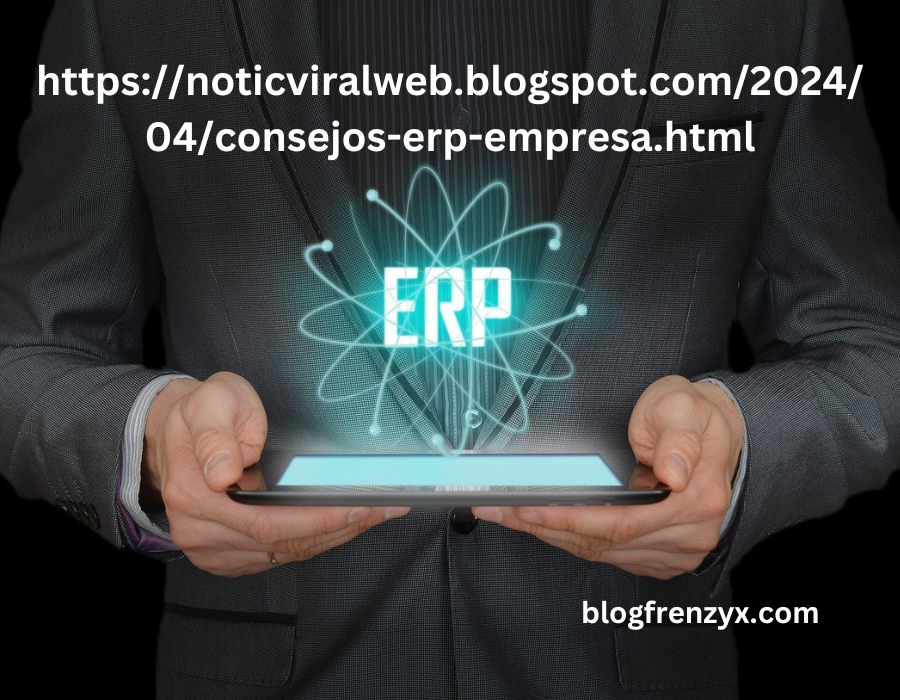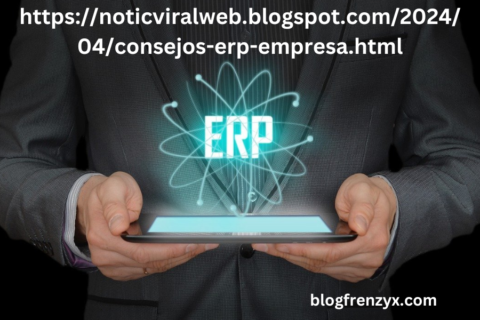A Comprehensive Guide to ERP Systems: Optimizing Business Operations
https://noticviralweb.blogspot.com/2024/04/consejos-erp-empresa.html have become crucial tools for businesses of all sizes. These systems streamline processes, improve productivity, and provide companies with a competitive edge in today’s fast-paced markets. Whether you’re running a small business or a multinational corporation, ERP systems help manage core business processes by integrating various departments like finance, human resources, sales, and supply chain into a single unified system. In this blog, we will explore what ERP systems are, their benefits, and how businesses can select and implement the right ERP solution.
Understanding ERP Systems
ERP systems refer to software platforms that allow businesses to automate and integrate core functions across various departments. The primary goal of an ERP system is to centralize information and create seamless processes within a business. This results in better communication and operational efficiency.
- Definition: ERP systems integrate business processes across different functions, such as finance, inventory, human resources, and customer management.
- Core functionalities: These include accounting, order processing, production management, supply chain control, and customer relationship management (CRM).
- Types of ERP solutions: ERP solutions come in various forms—cloud-based, on-premise, and hybrid systems—offering flexibility based on business needs.
- Key components: Effective ERP systems include modules for financial management, human resource management, inventory control, and data analysis.
Businesses can select from a range of ERP solutions that fit their specific needs and scale according to growth requirements.
Benefits of Implementing an ERP System
https://noticviralweb.blogspot.com/2024/04/consejos-erp-empresa.html can have a transformative impact on business operations, offering numerous advantages that improve efficiency and productivity across departments. When implemented correctly, it becomes the backbone of a company’s operational framework.
- Increased operational efficiency: ERP automates repetitive tasks and reduces manual errors, leading to faster and more accurate processes.
- Enhanced data accuracy: By centralizing data, ERP ensures that all departments work with the same updated information, reducing errors.
- Improved collaboration: With integrated systems, employees across different departments can access shared data, improving coordination and decision-making.
- Real-time reporting: ERP systems generate real-time reports, helping businesses track performance and make data-driven decisions.
- Cost savings: Efficient resource management and streamlined processes reduce operational costs in the long term.
These benefits allow companies to respond to market changes more effectively and remain competitive in a dynamic business environment.
Choosing the Right ERP System
Choosing an ERP system requires careful consideration. With numerous vendors offering various features, selecting the right one depends on several factors. Businesses must align their specific needs with the ERP solution that best fits their operational goals.
- Assess business needs: Before selecting an ERP, assess the specific requirements of your business and future scalability.
- Scalability: Choose a system that can grow with your business as it expands. Flexibility is essential for long-term success.
- Vendor comparison: Research popular ERP vendors, such as SAP, Oracle, Microsoft Dynamics, and NetSuite, to find one that fits your needs.
- Customization: Many ERP systems offer customization options. Ensure the chosen solution can adapt to unique business workflows.
By carefully evaluating business needs and ERP capabilities, companies can find a system that provides both short-term and long-term value.
Planning for Successful ERP Implementation
Implementing an ERP system is a complex project that requires careful planning. Without proper preparation, businesses may face challenges that delay or derail the project. Therefore, detailed preparation is crucial.
- Project preparation: Begin by establishing clear project goals and identifying key stakeholders from each department.
- Involve key departments: Engage department leaders and employees who will use the ERP system regularly in the planning phase.
- Realistic timelines: Set a timeline that reflects the complexity of the implementation. Rushing the process can lead to mistakes.
- Budget planning: Determine the total cost of implementation, including software, hardware, training, and potential future updates.
A solid plan ensures that the ERP implementation proceeds smoothly and meets organizational objectives.
Training and Change Management
Training employees and managing change are critical components of a successful https://noticviralweb.blogspot.com/2024/04/consejos-erp-empresa.html implementation. Employees need time to adapt to the new system, and proper training will help reduce resistance and improve acceptance.
- Employee training: Develop comprehensive training programs to ensure employees understand how to use the new system effectively.
- Change management: Introduce the system gradually and emphasize the benefits it brings to their day-to-day tasks.
- Positive attitudes: Foster a positive attitude towards the ERP by encouraging open communication and addressing concerns early.
- Support system: Provide ongoing support during the transition to ensure employees feel confident in their ability to use the system.
By prioritizing employee engagement and training, businesses can ensure the successful adoption of their ERP system.
Monitoring and Evaluating ERP Performance
Once the ERP system is live, monitoring its performance and evaluating its effectiveness is essential. This ensures that the system continues to meet business needs and operates efficiently.
- Key performance indicators (KPIs): Track metrics such as system uptime, data accuracy, and employee productivity to measure ERP success.
- Feedback collection: Gather feedback from employees to understand their experience with the system and identify areas for improvement.
- Continuous improvement: Regularly review and update the ERP system to optimize its functionality and adapt to business growth.
Monitoring performance helps businesses stay on top of potential issues and ensures that the system continues delivering value.
Conclusion
https://noticviralweb.blogspot.com/2024/04/consejos-erp-empresa.html have become indispensable for modern businesses. They enhance efficiency, streamline operations, and foster better collaboration across departments. By understanding ERP systems, choosing the right solution, and following a careful implementation plan, companies can unlock the full potential of their operations.
For businesses ready to optimize their processes, selecting the right ERP system is a step toward greater productivity and success. Have questions or experiences with ERP? Feel free to share them!
FAQs
What is an ERP system?
An ERP system is software that integrates and automates core business processes such as finance, inventory, and human resources.
What are the benefits of implementing an ERP system?
ERP improves efficiency, enhances data accuracy, fosters collaboration, and provides real-time reporting to help businesses make better decisions.
How do I choose the right ERP system for my business?
Assess your business needs, scalability, and compare vendors to find an ERP system that meets your operational goals.
What steps are necessary for a successful ERP implementation?
Plan thoroughly, involve key departments, set realistic timelines, and budget for the total cost of implementation.
Why is training important during ERP implementation?
Effective training ensures that employees can use the system properly, reducing errors and increasing system acceptance.
How do I monitor the performance of my ERP system?
Track key performance indicators (KPIs), gather user feedback, and continuously optimize the system to ensure it meets business needs.






